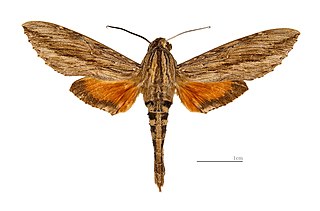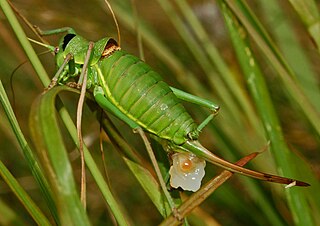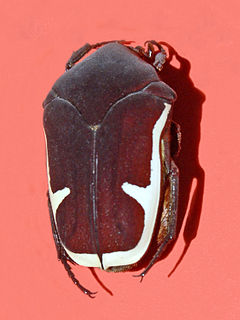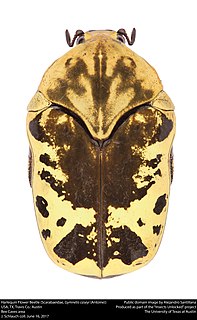
Karl Hermann Konrad Burmeister was a German Argentine zoologist, entomologist, herpetologist, and botanist. He was born in Stralsund and died in Buenos Aires. A brief biography, with particular reference to his work on phasmids was published by Bragg in 2007.

The Trichiini are a tribe of the scarab beetle family (Scarabaeidae), though historically they were often classified as a subfamily, Trichiinae. The conspicuous bee beetles (Trichius) are probably the best-known genus in Europe.

Flower chafers are a group of scarab beetles, comprising the subfamily Cetoniinae. Many species are diurnal and visit flowers for pollen and nectar, or to browse on the petals. Some species also feed on fruit. The group is also called fruit and flower chafers, flower beetles and flower scarabs. There are around 4,000 species, many of them still undescribed.

Rhombodera is a genus of praying mantises native to Asia and possessing common names such as shield mantis, hood mantis, and leaf mantis because of their extended, leaf-like thoraxes.
Paracles is a genus of moths in the subfamily Arctiinae. The genus was described by Francis Walker in 1855. The species range from Panama to Patagonia, with quite a few in the southern temperate region of South America.

The Phaneropterinae, the sickle-bearing bush crickets or leaf katydids, are a subfamily of insects within the family Tettigoniidae. Nearly 2,060 species in 85 genera throughout the world are known. They are also known as false katydids or round-headed katydids.

Dilophonotini is a tribe of moths of the family Sphingidae described by Hermann Burmeister in 1878.

The Bradyporinae are a subfamily in the family Tettigoniidae, based on the type genus Bradyporus. First described as a family, "Bradyporidae", the first use as Bradyporinae was by Brunner von Wattenwyl in 1878.

Cotinis is a genus of scarab beetles in the subfamily Cetoniinae found throughout North and South America. At least two species are common pests. The genus was erected by Hermann Burmeister in 1842.

Dysschema centenaria is a moth of the family Erebidae. It was described by Hermann Burmeister in 1878. It is found in Argentina.
Episcepsis obsoleta is a moth of the family Erebidae. It was described by Hermann Burmeister in 1878. It is found in Argentina.

Paracles costata is a moth of the subfamily Arctiinae first described by Hermann Burmeister in 1878. It is found in Brazil.

Gymnetis is a genus of beetles of the family Scarabaeidae and subfamily Cetoniinae.
Eurata igniventris is a moth of the subfamily Arctiinae. It was described by Hermann Burmeister in 1878. It is found in Argentina.

Hypocrisias fuscipennis is a moth of the subfamily Arctiinae. It was described by Hermann Burmeister in 1878. It is found in Argentina and Brazil.

Opharus picturata is a moth of the family Erebidae. It was described by Hermann Burmeister in 1878. It is found in Uruguay, Argentina and Brazil.
Euclera rubricincta is a moth of the subfamily Arctiinae first described by Hermann Burmeister in 1878. It is found in the Amazon region and Argentina.
Progona luridipennis is a moth in the subfamily Arctiinae. It was described by Hermann Burmeister in 1878. It is found in Argentina.

Tessellota cancellata is a moth in the family Erebidae. It was described by Hermann Burmeister in 1878. It is found in Argentina and Paraguay.

Gymnetini is a tribe of fruit and flower chafers in the family Scarabaeidae. There are 34 genera in Gymnetini, mostly New World.















